With good reason, spinach is considered a “superfood”. With its vibrant color and mild taste, this leafy green is packed with essential nutrients that benefit every part of your body—from your heart to your skin. Whether you enjoy it fresh in salads, blended into smoothies, or cooked into hearty meals, spinach offers many advantages for your health and well-being.
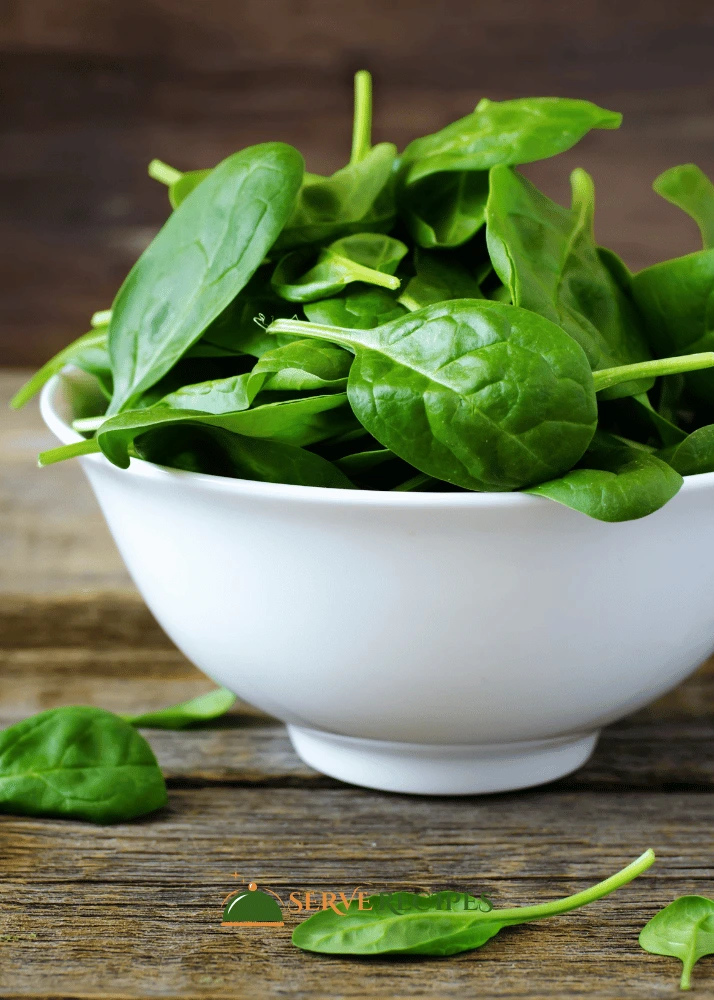
Table of Contents
Introduction
A balanced diet must include leafy greens; spinach is among the healthiest options. Often hailed for its high nutrient density and versatility, spinach is an easy addition to various dishes, bringing flavor and nutrients to the table. But beyond its culinary appeal, what makes spinach so unique? Let’s explore the science-backed health benefits of spinach and why it deserves a regular place in your diet.
Health Benefits of Spinach
Spinach for Boosting the Immune System
Spinach is a powerhouse of immune-boosting nutrients, making it a fantastic ally for keeping illnesses at bay. This green vegetable is loaded with vitamin C and beta carotene—two nutrients known for their immune-enhancing properties. Vitamin C is a potent antioxidant, helping protect your cells from damage caused by free radicals while promoting the production of infection-fighting white blood cells. Meanwhile, beta carotene, a precursor of vitamin A, supports the body’s immune function, ensuring that your defenses are solid and resilient.
Spinach for Heart Health: Supporting Cardiovascular Wellness
Including spinach in your diet will benefit your heart. Rich in nitrates, spinach helps improve blood flow by relaxing blood vessels, leading to better circulation and lower blood pressure. Additionally, spinach contains potassium and magnesium, which play critical roles in regulating blood pressure. Spinach’s high folate content also benefits cardiovascular health by lowering homocysteine levels, which can worsen heart disease when they are raised.
Spinach’s Role in Improving Digestion and Gut Health
Overall health depends on having a well-functioning digestive system, and spinach helps support this. Spinach is high in dietary fiber, which aids digestion by promoting regular bowel movements and preventing constipation. The fiber in spinach also acts as a prebiotic, feeding the beneficial bacteria in your gut and supporting a balanced microbiome. This can improve nutrient absorption, reduce bloating, and enhance overall digestive health.
Anti-inflammatory Properties of Spinach
Chronic inflammation is linked to several illnesses, including diabetes, heart disease, and arthritis. Antioxidants included in spinach, such as flavonoids and carotenoids, help fight inflammation at its root cause. One of these antioxidants, quercetin, has been studied for its potential to reduce inflammation and oxidative stress. Including spinach regularly in your diet can help control inflammation and reduce your chance of developing chronic illnesses.
Benefits of Spinach for Eye Health: Lutein Protects Vision
Our eyes are constantly exposed to light and environmental factors that can damage vision over time. Spinach contains two essential nutrients, lutein and zeaxanthin, which are known to protect against age-related macular degeneration (AMD) and cataracts. These antioxidants help filter harmful blue light and maintain the health of your retina, promoting long-term eye health. Including spinach in your diet is an intelligent strategy for safeguarding your vision as you age.
Spinach’s Function in Muscle Repair and Health
Adding spinach to your diet can be beneficial if you want to promote muscle growth and recuperation. Spinach contains a lot of magnesium and nitrates, which are also important; however, the protein does play a part. These compounds enhance muscle function and oxygen flow, improving your performance during workouts and aiding recovery afterward. Spinach also helps reduce muscle fatigue and cramping due to its magnesium content, essential for muscle relaxation and repair.
Nutritional Value of Spinach
Essential Vitamins and Minerals in Spinach
A fantastic source of several essential vitamins and minerals is spinach. It is vibrant in:
- Vitamin K: Necessary for healthy bones and blood coagulation.
- Vitamin A: Promotes healthy skin, eyesight, and immune system.
- Vitamin C: Encourages healthy skin and strengthens the immune system.
- Folate: Required for cell and tissue proliferation.
- Iron: Necessary for the oxygen transport mechanism in the blood.
Because spinach is low in calories and health-promoting chemicals, it is a nutritional powerhouse that meets many of your daily requirements for these nutrients in just one serving.
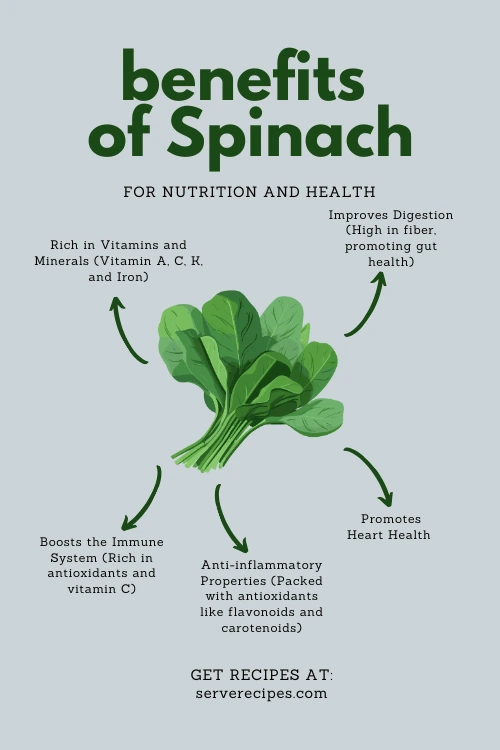
High Iron Content: How Spinach Helps Combat Anemia
Iron is a critical mineral that plays a role in red blood cell production, and spinach is one of the best plant-based sources of iron. While the type of iron found in spinach (non-heme iron) is not as easily absorbed as the iron from animal sources, pairing spinach with vitamin C-rich foods (like tomatoes or citrus) can enhance its absorption. For vegetarians or those prone to iron deficiency, including spinach in your diet can help prevent anemia and boost your energy levels.
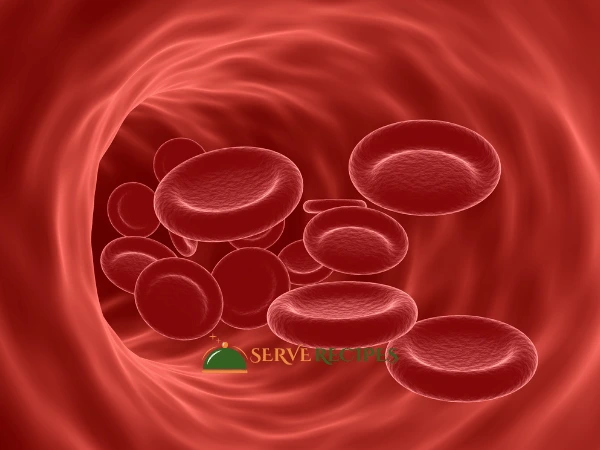
Spinach for Bone Health: Strengthening Bones with Vitamin K
Maintaining strong bones is essential for preventing fractures and osteoporosis as we age. Spinach is an excellent source of vitamin K, a nutrient that plays a crucial role in bone mineralization and density. Vitamin K helps reduce the risk of bone fractures by promoting calcium absorption in the bones. Regular consumption of spinach can support long-term bone health, especially when combined with other calcium-rich foods.
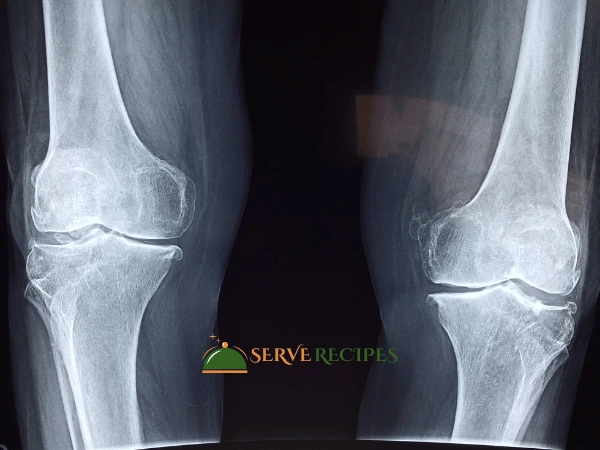
Spinach as a Rich Source of Antioxidants
The antioxidant content of spinach is one of its most celebrated qualities. Spinach also has beta-carotene and vitamin C, but it also has flavonoids and polyphenols, which are strong antioxidants. These compounds protect your body from oxidative stress and the damage caused by free radicals, which can contribute to aging and various diseases. The antioxidants in spinach help neutralize these harmful molecules, reducing your risk of chronic conditions and promoting overall health.
Spinach for Skin and Hair
Spinach for Glowing Skin: Nourishing with Vitamins
If you’re looking to achieve a natural glow, spinach can be your go-to beauty food. Its high vitamin A content is crucial for maintaining healthy skin by promoting cell turnover and repair. Vitamin C in spinach also plays a role in collagen production, which keeps skin firm and youthful. The antioxidants in spinach help combat the effects of environmental stressors, making your skin appear more radiant and smooth.
Promoting Hair Health with Spinach’s Vital Nutrients
Spinach is equally beneficial for hair health. The iron in spinach improves circulation to the scalp, ensuring that your hair follicles receive the nutrients they need for growth. Additionally, the vitamins A and C in spinach help produce sebum, the scalp’s natural oil, which nourishes and strengthens your hair. Including spinach in your diet can help reduce dryness, breakage, and thinning hair.
Spinach for Weight Loss
Low-Calorie Powerhouse: Why Spinach is Ideal for Weight Loss
For those looking to lose weight, spinach is an excellent addition to a balanced diet. It is low in calories yet high in nutrients, allowing you to fill up without consuming too many calories. Spinach’s fiber content helps keep you feeling full and satisfied, reducing the likelihood of overeating or snacking on less healthy options.
How Spinach Helps Reduce Hunger and Promote Satiety
The fiber in spinach not only aids digestion but also helps control appetite by slowing down the digestive process. This leads to a gradual release of energy, keeping you satisfied for extended periods. Spinach can be especially beneficial as part of a weight loss plan when paired with other lean proteins and healthy fats that work together to curb hunger and promote satiety.
Spinach for Brain Health
Cognitive Benefits: How Spinach Supports Brain Function
The antioxidants and nutrients in spinach aren’t just good for your body—they’re great for your brain, too. Studies have shown that the flavonoids in spinach can help improve cognitive function and memory, particularly in older adults. Spinach is rich in folate, which has been linked to reduced rates of cognitive decline, while its antioxidant properties help protect the brain from oxidative stress and inflammation.
Spinach for Memory Improvement and Brain Aging Prevention
Research suggests regularly consuming spinach may help slow brain aging and protect against neurodegenerative diseases like Alzheimer’s. Spinach’s combination of vitamins, minerals, and antioxidants helps preserve brain function by reducing inflammation and supporting neurotransmitter activity. Incorporating spinach into your meals is a simple way to keep your brain sharp as you age.
Raw vs. Cooked Spinach
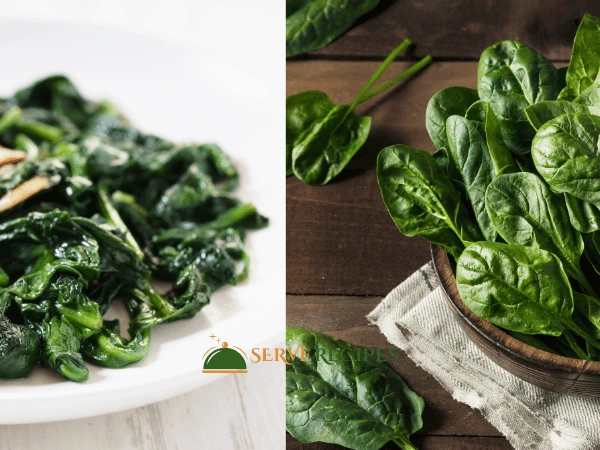
Nutritional Differences: Raw Spinach vs Cooked Spinach
Raw and cooked spinach offer valuable nutrients, but how you prepare it can affect its nutrient profile. Raw spinach retains more vitamin C, while cooked spinach has higher levels of certain nutrients like vitamin K and iron, which become more bioavailable through cooking. Cooking, however, may cause specific water-soluble vitamins, such as vitamin C and folate, to decrease. Consider incorporating raw and cooked spinach into your diet for the best of both worlds.
Best Ways to Cook Spinach to Retain Its Nutrients
When cooking spinach, it’s best to use methods that preserve as many nutrients as possible. Steaming, sautéing, or lightly boiling spinach are significant options that help retain its vitamins and minerals without significantly diminishing its nutritional value. Pairing cooked spinach with healthy fats, like olive oil, can also enhance the absorption of fat-soluble nutrients such as vitamins A and K.
Incorporating Spinach into Your Diet
Simple and Tasty Ways to Include Spinach in Your Meals
Spinach is incredibly versatile, making it easy to add to nearly any dish. Here are a few simple ways to incorporate more spinach into your diet:
- Salads: Use raw spinach as a base for your favorite salads.
- Smoothies: For an added nutritional boost, include some spinach in your morning smoothie.
- Soups and Stews: Stir fresh spinach into soups or stews before serving.
- Egg Dishes: Mix spinach into scrambled eggs, omelets, or frittatas for a nutritious breakfast.
Healthy Spinach Recipes to Try Today
Looking for some inspiration? Here are a few healthy spinach-based recipes you can try:
- Spinach and Feta Stuffed Chicken: A delicious, protein-packed dish perfect for dinner.
- Green Smoothie Bowl: Blend spinach with banana, almond milk, and chia seeds for a refreshing and energizing start to your day.
- Spinach and Mushroom Quiche: A filling and tasty meal for breakfast, lunch, or dinner.
Spinach Myths and Misconceptions
Addressing Common Myths About Spinach and Kidney Stones
One common misconception about spinach is that it contributes to kidney stone formation due to its oxalate content. While it’s true that spinach contains oxalates, which can bind with calcium to form kidney stones, the risk is primarily for people who are predisposed to stone formation or consume spinach in massive amounts. For most people, moderate consumption of spinach is not a concern.
Debunking the Myth: Does Spinach Reduce Calcium Absorption?
Another misconception is that spinach prevents the body from absorbing calcium. While spinach contains oxalates that can inhibit calcium absorption, it’s important to remember that a well-balanced diet offers multiple sources of calcium. By consuming a variety of foods rich in calcium, this issue becomes negligible. Spinach is still an excellent source of other vital nutrients like magnesium, which supports bone health.
Conclusion
Spinach is a nutritional powerhouse, from supporting heart health to improving brain function. Its rich blend of vitamins, minerals, and antioxidants makes it one of the healthiest vegetables. Whether you’re looking to boost your immune system, improve your digestion, or maintain a balanced diet, spinach offers many health benefits that can help you thrive. Incorporating this leafy green into your daily meals will nourish your body with one of nature’s finest superfoods.
More blogs to read:
7 Amazing Health Benefits of Kangkong: A Superfood You Need
Can spinach help with weight loss?
Absolutely! Spinach is low in calories and rich in fiber, helping you feel full longer and reducing cravings. It’s a nutrient-dense option that supports weight loss without adding excess calories.
Is it preferable to consume cooked or raw spinach?
Both have benefits. Raw spinach has more vitamin C while cooking increases the absorption of iron and calcium. Eating a mix of raw and cooked spinach ensures you get the best of both.
What vitamins and minerals are found in spinach?
Spinach contains vitamins A, C, K, folate, iron, and magnesium—essential nutrients for vision, immunity, bones, and muscle function.
How much spinach should I eat daily?
1-1.5 cups of cooked or 2-3 cups of raw spinach daily is ideal for a healthy intake of nutrients. It’s low in calories, so you can enjoy more if desired.
Can spinach help improve digestion?
Yes, spinach’s high fiber content promotes healthy digestion, prevents constipation, and feeds good gut bacteria, supporting overall gut health.